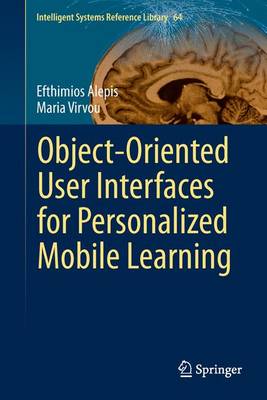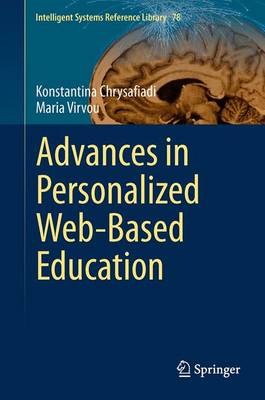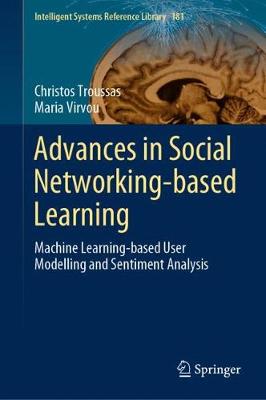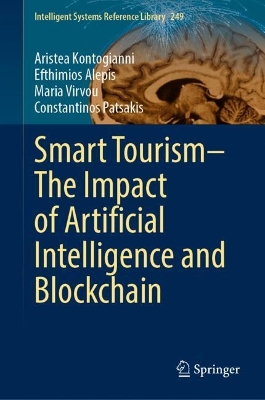Intelligent Systems Reference Library
4 primary works
Book 64
Object-Oriented User Interfaces for Personalized Mobile Learning
by Efthimios Alepis and Maria Virvou
This book presents recent research in mobile learning and advanced user interfaces. It is shown how the combination of these fields can result in personalized educational software that meets the requirements of state-of-the-art mobile learning software. This book provides a framework that is capable of incorporating the software technologies, exploiting a wide range of their current advances and additionally investigating ways to go even further by providing potential solutions to future challenges. The presented approach uses the well-known Object-Oriented method in order to address these challenges.
Throughout this book, a general model is constructed using Object-Oriented Architecture. Each chapter focuses on the construction of a specific part of this model, while in the conclusion these parts are unified. This book will help software engineers build more sophisticated personalized software that targets in mobile education, while at the same time retaining a high level of adaptivity and user-friendliness within human-mobile interaction.
Book 78
Advances in Personalized Web-Based Education
by Konstantina Chrysafiadi and Maria Virvou
This book aims to provide important information about adaptivity in computer-based and/or web-based educational systems. In order to make the student modeling process clear, a literature review concerning student modeling techniques and approaches during the past decade is presented in a special chapter. A novel student modeling approach including fuzzy logic techniques is presented. Fuzzy logic is used to automatically model the learning or forgetting process of a student. The presented novel student model is responsible for tracking cognitive state transitions of learners with respect to their progress or non-progress. It maximizes the effectiveness of learning and contributes, significantly, to the adaptation of the learning process to the learning pace of each individual learner. Therefore the book provides important information to researchers, educators and software developers of computer-based educational software ranging from e-learning and mobile learning systems to educational games including stand alone educational applications and intelligent tutoring systems.
Book 181
Advances in Social Networking-based Learning
by Christos Troussas and Maria Virvou
This book discusses three important, hot research issues: social networking-based learning, machine learning-based user modeling and sentiment analysis. Although these three technologies have been widely used by researchers around the globe by academic disciplines and by R&D departments in the IT industry, they have not yet been used extensively for the purposes of education. The authors present a novel approach that uses adaptive hypermedia in e-learning models to personalize educational content and learning resources based on the needs and preferences of individual learners. According to reports, in 2018 the vast majority of internet users worldwide are active on social networks, and the global average social network penetration rate as of 2018 is close to half the population. Employing social networking technologies in the field of education allows the latest technological advances to be used to create interactive educational environments where students can learn, collaborate with peers and communicate with tutors while benefiting from a social and pedagogical structure similar to a real class.
The book first discusses in detail the current trend of social networking-based learning. It then provides a novel framework that moves further away from digital learning technologies while incorporating a wide range of recent advances to provide solutions to future challenges. This approach incorporates machine learning to the student-modeling component, which also uses conceptual frameworks and pedagogical theories in order to further promote individualization and adaptivity in e-learning environments. Moreover, it examines error diagnosis, misconceptions, tailored testing and collaboration between students are examined and proposes new approaches for these modules. Sentiment analysis is also incorporated into the general framework, supporting personalized learning by considering the user's emotional state, and creating a user-friendly learning environment tailored to students' needs. Support for students, in the form of motivation, completes the framework. This book helps researchers in the field of knowledge-based software engineering to build more sophisticated personalized educational software, while retaining a high level of adaptivity and user-friendliness within human-computer interactions. Furthermore, it is a valuable resource for educators and software developers designing and implementing intelligent tutoring systems and adaptive educational hypermedia systems.
Book 249
Smart Tourism–The Impact of Artificial Intelligence and Blockchain
by Aristea Kontogianni, Efthimios Alepis, Maria Virvou, and Constantinos Patsakis
This book offers a fresh perspective on smart tourism, introducing unique frameworks and insights with the potential to shape the industry's future. It explores the convergence of technology, tourism, and smart cities, emphasizing the use of smartphones, social media data, AI, blockchain, crowdsourcing, and crowdsensing to enhance tourism experiences.
What sets it apart is its focus on practical solutions that require minimal infrastructure investments, making it accessible to a wide range of stakeholders. This book addresses knowledge gaps and proposes cutting-edge frameworks for smart tourism development. It is intended for researchers, academics, and professionals in tourism, technology, and urban planning.
Key uses of this book include providing a comprehensive overview of the evolving smart tourism landscape and serving as a valuable resource for researchers and educators in this dynamic field.



